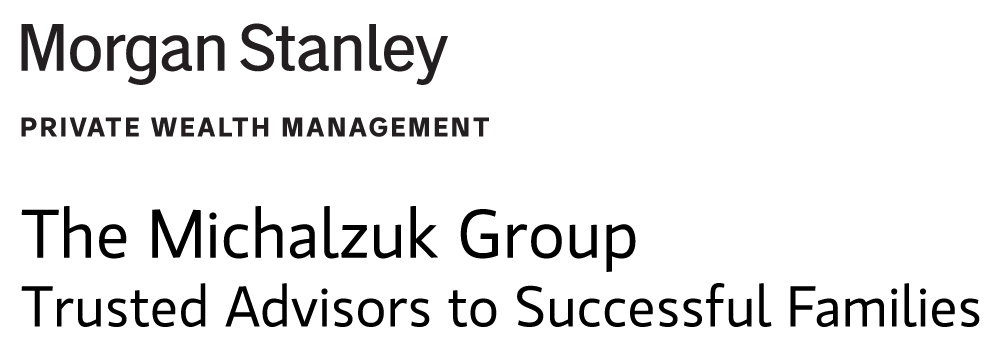Policy Is Moving. Add Your Voice Now.

From: Kevin Michalzuk
Morgan Stanley Private Wealth Management
In my years working with successful owners of privately held companies, I have noticed that even those who are highly strategic in their approach to growing their businesses are far less intentional in their approach to selling it or passing it down to younger generations. As a result, they make decisions, or are forced into decisions, they come to regret. In fact, a study by the Exit Planning Institute revealed that three-quarters of owners who sold their business “profoundly regret” selling it within a year.(1)
Many of the transition processes we have advised on have been initiated for non-strategic reasons, often due to unforeseen things like a change in the economy, shifting business dynamics, a life event that realigns their personal priorities, or family governance and legacy considerations. There have also been times when an unsolicited offer makes them realize the value they have created and that their freedom and ability to pursue other interests is their most precious resource.
In a recent survey of family business owners by PWC, 78% of U.S. respondents said that protecting their business is their top long-term goal and 72% said they want to ensure the business says in the family. Yet only 34% said they had a robust, documented and communicated succession plan in place.(2) This confirms what we have found in advising many family business owners. While most owners understand the importance of planning, there are often two factors that most commonly keep them from engaging in the process.
Many multi-generational enterprises have embraced the idea that selling the family business is a form of failure, and many see transition planning as a strictly “sell or don’t sell” proposition. This can lead stakeholders to avoid engaging in the topic altogether. What they are forgetting is that all businesses eventually transition. An exit of the current ownership is inevitable and may be the only certainty in running a business.
Fortunately, if you have built a viable enterprise, you may have put yourself in position to influence or maybe even determine when, to whom, and how you want that transition to occur. Making that determination requires discipline and the courage to engage in a process that, at its core, accepts your own mortality.
Second, the professional advisor community tends to counsel business owners on transition planning with an emphasis on the technical best practices of their discipline. Experts in tax codes, legal matters, investment banking, risk management and wealth planning all have important roles to play. The narrow focus and technical jargon often, though, is not the best place to start. A transition process should encompass a broad range of considerations that impact the owners, the company, and its many stakeholders – and the approach should consider the personality traits of the owners.
Business owners that have built successful enterprises are often credited with having a high propensity for risk-taking, act as constant innovators, display a high need for achievement, exhibit a high tolerance for ambiguity, and often a strong desire for influence or control. Qualities like innovativeness, risk taking, and tolerance for ambiguity are probably not the same qualities often used to describe the legal, tax, and investment professionals advising the family business community. To increase the probability of successful outcomes, these professionals need to tailor their approach to recognize these traits which often drive that owner’s success.
Example:
A business owner was approached by an insurance agent who suggested that heirs to the family business may be forced to sell the company to cover estate tax liabilities. He recommended a life insurance solution to avoid this potential forced sale. After several meetings, the owner ultimately decided to do nothing, suggesting the next generation of his family could cross that bridge when they come to it. The fear-based approach didn’t get him to the place where he needed to act.
In our initial discussions with business owners, we often find that some level of transition has been initiated, usually based on a tactical solution to a particular challenge. It is our experience that a tactical approach reduces the likelihood of action, or ultimately ends to a non-optimal (or worse haphazard) application as it lacks connection to a bigger strategic transition plan. That’s why we prefer to start with more fundamental questions, particularly those focused on understanding and appreciating the unique qualities that made the business owner successful and ultimately what success looks like for them in the future.
I believe that our comprehensive approach provides an opportunity for rare achievement – the ability to transition businesses on our clients’ terms – how, to whom, and when they ultimately wish to. By starting the transition conversation with a deep understanding of the owner’s values and vision (the why), we can coordinate with their tax and legal professionals to best position solutions (the how and what), while collectively working to help ensure that all ideas and approaches are considered and align with the client’s stated objectives.
If you are interested in engaging in thoughtful discussion around your vision for a successful transition, or reviewing a plan that has already been created or enacted, we would be happy to help. Personalized guidance begins with an exploratory discussion, please contact us here.
Kevin Michalzuk
Executive Director
Private Wealth Advisor
14850 N Scottsdale Road, Suite 600
Scottsdale, AZ 85254
Direct: (480) 922-7988
[email protected]
The Michalzuk Group at Morgan Stanley Private Wealth Management was founded to simplify the complexities of multi-generational wealth. As a part of Morgan Stanley Private Wealth Management offering, the Michalzuk Group provides the resources and institutional execution of one of the largest and most respected global financial service firms. To learn more about The Michalzuk Group at Morgan Stanley Private Wealth Management, visit our website.
1Source: https://blog.exit-planning-institute.org/emotional-considerations-transitions#:~:text=Of%20those%20that%20succeed%20in,year%20of%20exiting%20their%20business.
2Source: https://www.pwc.com/us/en/services/trust-solutions/private-company-services/library/family-business-survey.html
This case study is hypothetical and presented for illustrative purposes only. The facts involved do not represent the actual experience of any specific client. Each client’s situation is different and a client’s experience and any recommendations made to a client will vary depending on the specific facts and circumstances involved. Past performance is no guarantee of future results. These strategies do not guarantee a profit or protect against loss and may not be appropriate for all investors.
Information contained herein has been obtained from sources considered to be reliable, but we do not guarantee their accuracy or completeness.
This material has been prepared for informational purposes only. It does not provide individually tailored investment advice. It has been prepared without regard to the individual financial circumstances and objectives of persons who receive it. Morgan Stanley Smith Barney LLC (“Morgan Stanley”) recommends that investors independently evaluate particular investments and strategies, and encourages investors to seek the advice of a Morgan Stanley Financial Advisor. The appropriateness of a particular investment or strategy will depend on an investor’s individual circumstances and objectives. Past performance is no guarantee of future results.
Morgan Stanley Smith Barney LLC (“Morgan Stanley”), its affiliates and Morgan Stanley Financial Advisors or Private Wealth Advisors do not provide tax or legal advice. Individuals should consult their tax advisor for matters involving taxation and tax planning and their attorney for matters involving trusts, estate planning, charitable giving, philanthropic planning or other legal matters.
Morgan Stanley Smith Barney LLC offers a wide array of brokerage and advisory services to its clients, each of which may create a different type of relationship with different obligations to you. Please visit us at http://www.morganstanleyindividual.com or consult with your Financial Advisor to understand these differences.
The views expressed herein are those of the author and do not necessarily reflect the views of Morgan Stanley Wealth Management or its affiliates. All opinions are subject to change without notice. Neither the information provided, nor any opinion expressed constitutes a solicitation for the purchase or sale of any security. Past performance is no guarantee of future results.
Morgan Stanley Private Wealth Management, a division of Morgan Stanley Smith Barney LLC. Member SIPC.
3741069 07/24

The Michalzuk Group at Morgan Stanley Private Wealth Management
The Michalzuk Group at Morgan Stanley Private Wealth Management was founded to simplify the complexities of multi-generational wealth. As a part of Morgan Stanley Private Wealth Management offering, the Michalzuk Group provides the resources and institutional execution of one of the largest and most respected global financial service firms. To learn more about The Michalzuk Group at Morgan Stanley Private Wealth Management, visit our website.
We hope you’ve enjoyed this article. While you’re here, we have a small favor to ask…
As we prepare for what promises to be a pivotal year for America, we’re asking you to consider becoming a supporter.
The need for fact-based reporting of issues important to family offices and successful families and protecting a lifetime of savings has never been greater. Now more than ever, family offices and successful families are under fire. That’s why Family Enterprise USA Action is passionately working to increase the awareness of issues important to family offices and successful families, while continuing to strengthen our presence on Capitol Hill.
Family Enterprise USA Action engages with legislators on Capitol Hill on behalf of family offices, successful families, and family-owned businesses. It is focused exclusively on the critical tax and economic policies that impact them. Since 1995, FEUSA Action has been the leading advocacy group working daily in Washington, D.C., to reduce and eliminate estate tax, gift tax, and generation skipping transfer tax while blocking increased income and capital gains taxes, the creation of a wealth tax, and other hostile policies that punish hardworking taxpayers and success in the U.S. It is a bipartisan 501.c4 organization.
#incometax #CapitalGainsTax #R&DExpensing #DontPunishSuccess #GrantorTrusts #likeKindExchanges #AcceleratedDepreciation #EstateTax #Deathtax #wealthtax #taxLegislation #incometaxrates #repealestatetax #FamilyOffice #SuccessfulFamilies @PolicyAndTaxationGroup @DitchTheEstateTax #PolicyAndTaxationGroup #DitchTheEstateTax #FamilyEnterpriseUSAAction

